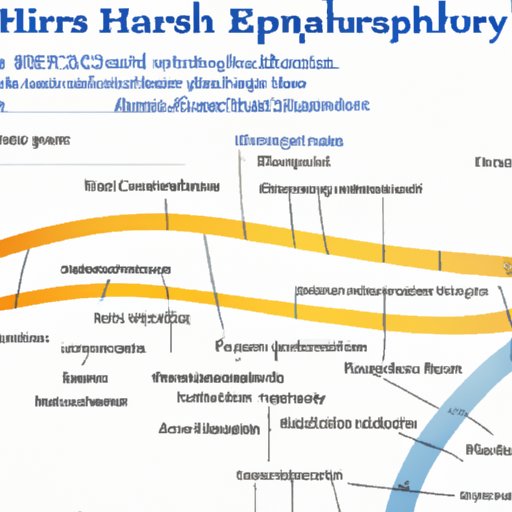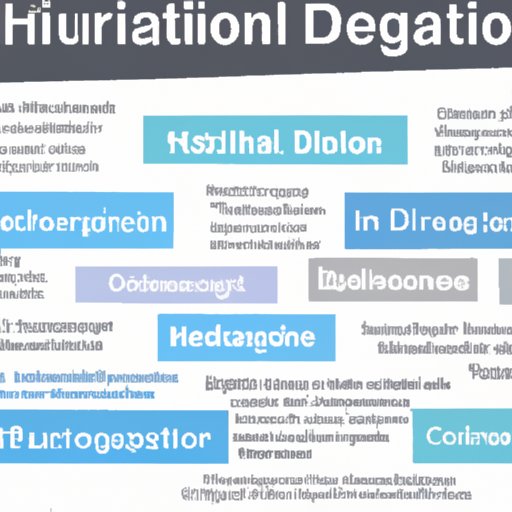Introduction
The role of health information technology (HIT) is increasingly important in today’s healthcare system. HIT professionals are responsible for managing, analyzing and communicating patient data to ensure that healthcare providers have the most up-to-date information to deliver quality care. With the rise in demand for skilled HIT professionals, many individuals are turning to a health information technology degree to gain the skills and knowledge needed to work in this field.
This article explores what you can do with a health information technology degree. We’ll look at the different career options available, the requirements for specific positions, and the potential benefits of pursuing such a degree. We’ll also analyze the current trends and technologies in health information technology, as well as the impact of technology on healthcare delivery.

Exploring Career Options: A Guide to What You Can Do with a Health Information Technology Degree
A health information technology degree can open the door to a variety of career opportunities in the field. According to the U.S. Bureau of Labor Statistics, some of the most common jobs for those with a health information technology degree include medical records technicians, health information technicians, and health information administrators.
Medical records technicians are responsible for organizing and maintaining patient records, ensuring accuracy and confidentiality of the information. They must be familiar with federal regulations related to health information, including the Health Insurance Portability and Accountability Act (HIPAA). Health information technicians are responsible for coding and classifying medical data for reimbursement and research purposes. They must be knowledgeable about medical terminology, coding systems, and classification software.
Health information administrators oversee the daily operations of medical records departments. They must be knowledgeable about all aspects of HIT, including computer systems, privacy laws, and data analysis. They may also be responsible for developing policies and procedures related to health information management.
In addition to these traditional roles, there are a number of other career paths you can pursue with a health information technology degree. For example, you could become a consultant, providing advice and guidance on the use of technology in healthcare settings. You could also become a project manager, leading teams of HIT professionals in the development and implementation of new technologies.
No matter which path you choose, it’s important to remember that employers are looking for candidates who have a strong understanding of the latest trends and technologies in health information technology. To ensure that you stay competitive, you should strive to keep your skills and knowledge up-to-date.

Charting Your Course: An Overview of the Health Information Technology Landscape
As you consider the various career options available in health information technology, it’s important to understand the current trends and technologies in the field. Recent advances in technology have had a major impact on the way healthcare is delivered, from improving patient outcomes to increasing efficiency.
For instance, electronic health records (EHRs) have revolutionized the way healthcare providers store and share patient information. By using EHRs, healthcare providers can quickly access patient data, reducing the risk of medical errors and improving the accuracy of diagnoses. In addition, telemedicine has enabled physicians to provide remote care to patients, eliminating the need for in-person visits.
These advances have created a number of job opportunities in the field, from positions focused on developing and implementing new technologies to roles that involve managing and analyzing data. As the healthcare industry continues to embrace technology, the demand for skilled HIT professionals will only continue to grow.
“With the rapid advancements in healthcare technology, there is an increased demand for professionals who understand the complexities of the healthcare system and how technology can improve it,” says Ellen Fink-Samnick, MSW, ACSW, LCSW-C, CCM, CRP, FABC, a senior consultant at Triage Consulting Group. “Those with a health information technology degree are uniquely positioned to fill this need.”
Analyzing the Benefits of Pursuing a Health Information Technology Degree
In addition to the job opportunities available in health information technology, there are a number of other benefits to pursuing a health information technology degree. For starters, a degree in this field will give you the skills and knowledge needed to succeed in the field, such as data management, analytics, and communication.
In addition, having a degree in health information technology can help you stand out from the competition when applying for jobs. According to the American Health Information Management Association (AHIMA), employers are increasingly seeking candidates with formal education and training in health information technology.
Finally, a health information technology degree can also help you increase your earning potential. According to the Bureau of Labor Statistics, the median annual wage for health information technicians is $40,350, while the median annual wage for health information administrators is $99,730.

Keeping Pace with the Latest Trends in Health Information Technology
In order to remain competitive in the field of health information technology, it’s important to stay up-to-date on the latest advancements in technology. This could mean attending conferences and seminars, joining professional organizations, or subscribing to industry publications.
It’s also important to identify emerging opportunities in the field. For instance, with the rise of artificial intelligence (AI) and machine learning, there is an increasing demand for professionals who understand how to leverage these technologies to improve healthcare delivery. Alternatively, you could explore opportunities in areas such as cybersecurity, data analytics, and population health.
Finally, it’s important to examine how technology is changing healthcare delivery. From virtual visits to personalized medicine, technology is transforming the way healthcare is accessed and delivered. Understanding the implications of these changes can help you stay ahead of the curve.
Conclusion
A health information technology degree can open the door to a variety of career opportunities in the field. From medical records technicians to health information administrators, there are a number of job paths you can pursue with a degree in health information technology. In addition, having a degree in this field can help you enhance your skills, increase your employability, and increase your earning potential.
By staying up-to-date on the latest trends and technologies in health information technology, you can ensure that you remain competitive in the field. And by exploring emerging opportunities in the field, you can chart a successful course for your career in health information technology.
(Note: Is this article not meeting your expectations? Do you have knowledge or insights to share? Unlock new opportunities and expand your reach by joining our authors team. Click Registration to join us and share your expertise with our readers.)
